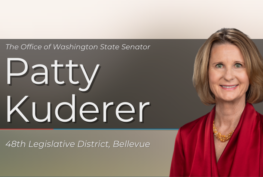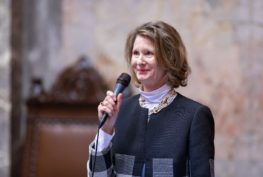Dear friends and neighbors,
I would like to provide you with a brief review of our historic 2023 legislative session and one-day special session, but before I begin, I want you to know I am honored and filled with immense gratitude for the opportunity to continue serving as your state senator. Over the past months, we have witnessed tireless dedication, impassioned debates, and unwavering commitment from lawmakers, advocates, and community members. As we reflect upon the incredible hard work accomplished during this session, I am convinced it has not only shaped the present but also laid the foundation for a brighter future for Washingtonians. I want to share with you some highlights from a truly remarkable session.
The year of housing
As chair of the Senate Housing Committee, I can tell you this was the year of housing in Washington! Our statewide housing crisis brought both sides together, working collaboratively to address the challenges of affordable housing and homelessness in our state. I am proud to share our Legislature passed significant bills and made historic investments to increase the supply of housing, support homeowners and renters, and open homeownership opportunities.
Here are some of the housing bills that were signed into law:
- HB 1110, the “Middle Housing” bill, allows for the construction of more attached single-family homes throughout our state.
- HB 1474 creates the first in the nation Covenant Homeownership Program to address the racial wealth gap and open up homeownership opportunities to those impacted by generational discrimination and redlining. Much of that gap arises from our shameful history of restrictive covenants that prevented racial and religious minorities from purchasing homes in certain neighborhoods.
- HB 1042 helps quickly increase housing supply by facilitating renovation of underutilized or vacant commercial and mixed-use buildings into residences.
- HB 1349 protects vulnerable homeowners, particularly low-income households, and seniors, from predatory foreclosures.
- HB 1337 reduces barriers to the construction of new accessory dwelling units (ADUs).
- SB 5045, a pilot program in King County, addresses the affordable housing shortage by giving homeowners a property tax exemption when they rent an attached or detached “mother-in-law” apartment to a qualified low-income household.
- HB 1695 expands the definition of “public benefit” to include the use of surplus public property to create affordable housing, including rental and homeownership, targeting low-income households.
- HB 1046 expands housing supply by supporting the ability of public housing authorities to finance affordable housing developments.
- SB 5058 makes it easier to construct small-scale condominiums.
- SB 5197 clarifies Washington’s eviction process to allow for remote court hearings on evictions, permits greater access to emergency rental assistance funds, and expands judicial discretion around 14-day pay-or-vacate notices.
- HB 1074 helps tenants who are moving out of their current rental by increasing transparency and accountability in the handling of their security deposits.
- SB 5198 protects vulnerable tenants in manufactured home communities by requiring owners to give two years’ notice of sale and give the tenants a fair chance to come together and make an offer to purchase the park themselves.
- SB 5290 streamlines the permitting process to ensure housing projects are not unnecessarily delayed.
Additionally, the state’s new two-year operating and capital construction budgets adopted by the Legislature make significant new investments in projects that will increase affordable housing and reduce homelessness. Here are a few highlights:
- $400 million, a record investment, in the Housing Trust Fund for construction and renovation of affordable housing units to serve low-income and special needs populations.
- $150 million to start the Covenant Homeownership Program.
- $141 million increase for emergency housing and shelter funding.
- $60 million for homeless encampment response and rapid rehousing.
- $30 million to address youth homelessness.
- $27 million increase for the Housing and Essential Needs program.
While these policies and investments mark significant progress in our efforts to address the housing crisis, our work is far from over. I am committed to continue working collaboratively to ensure access to affordable housing and ending homelessness in our state.
Investing in education
From securing additional funding for students with disabilities to expanding access to affordable early learning and childcare, we have made substantial strides in building a top-tier education system. These achievements are a testament to our commitment to providing quality education and empowering students of all ages to thrive.
The most notable victory in K-12 education was a substantial investment in services for kids with disabilities. Schools across the state will receive $372 million in additional funding over the next two years, thanks to the passage of HB 1436. The legislation will also help increase inclusion efforts and outcomes for students with disabilities by building a stronger system of supports.
Several other bills aim to improve our schools:
- HB 1238 increases the number of students who have access to free breakfast and lunch. Starting next year, any school with 30% or more of their students eligible for free and reduced-price meals must provide a free breakfast and lunch to any student in kindergarten through 4th grade that requests it.
- SB 5072 expands access to accelerated learning and other types of enhanced instruction necessary for supporting our most highly capable students. The bill requires universal screening in or before second grade and then again in or before sixth grade for all students to identify and include students who traditionally are not referred for the services.
- HB 1207 provides students, teachers, and parents with another tool to address harassment and bullying by requiring OSPI to develop a model student handbook explaining our state’s anti-harassment and anti-bullying policies and complaint procedures.
- SB 5257 guarantees that all elementary school students have access to at least 30 minutes of recess each full day of school and makes clear that recess should not be withheld as a disciplinary or punitive action.
- SB 5355 requires that districts provide instruction in sex trafficking prevention and identification at least once between grades 7 and 12.
The state’s two-year capital budget also provided continued funding for school seismic safety retrofits, career, and technical education program equipment, and building improvements to support physical health and nutrition. Here are some additional investments in education in our state:
- Invested in low-interest graduate student loans
- Expanded access to grants and dual credit programs
- Supported new nursing and healthcare degree programs
- Prioritized facility upgrades and clean energy initiatives.
- Expanded eligibility for childcare programs
- Allocated funds to modernize and renovate childcare facilities
Ensuring gun safety
This 2023 legislative session, we also tackled one of the most pressing issues facing our nation: gun violence. Recognizing the urgent need to protect our loved ones and prevent tragic incidents, we dedicated ourselves to enacting meaningful measures that strike a balance between responsible gun ownership and safeguarding our families. As our nation grapples with ongoing gun violence, our state Legislature took further action this session. I’ve said it many times this session, and I’ll say it again: Enough is enough! Together, we have taken significant steps towards a safer future, and I am proud to share with you the accomplishments we have achieved in this critical area. With a steadfast belief in the power of proactive action, we have championed legislation that will shape a society where our schools, streets, and homes are havens of security.
Here are some significant gun safety bills that passed this year:
- HB 1240 bans the sale, manufacture, and import of assault weapons in Washington state, making us the 10th state in the nation to implement such a ban.
- HB 1143 institutes a 10-day waiting period for all firearm purchases and requires comprehensive safety training.
- SB 5078 requires gun manufacturers and dealers to implement reasonable controls to prevent dangerous individuals from accessing firearms.
- SB 5006 facilitates the voluntary waiver of firearm rights program, allowing individuals in mental health crises to surrender their guns.
- HB 1562 enhances safety for domestic violence survivors by making it more challenging for perpetrators to regain gun rights.
- SB 5231 empowers police to immediately remove guns from the scene of domestic violence incidents, rather than waiting for a court date.
- HB 1230 mandates school districts to provide updated information on secure storage of firearms, along with prescription drugs and substance use trends.
My dedication to our community’s safety remains unwavering. The measures we have taken during the 2023 legislative session to address gun violence are significant, but there is more we can do to reduce gun violence. I will continue to advocate for effective gun safety measures, ensuring our schools, neighborhoods, and public spaces are protected. Together, we can create a future where responsible gun ownership coexists with the peace of mind that comes from knowing our loved ones are safe.
Investing in the 48th
During this legislative session, a great deal of focus was placed on passing three crucial budgets: operating, capital, and transportation. These budgets provide substantial funding for various projects and organizations statewide, including several within the 48th District. Here is a look at some of these investments.

Addressing Washington’s drug crisis
When we finished the legislative session in April, we had many reasons to feel proud, except for one significant issue – we hadn’t acted on Washington’s drug addiction crisis, which was disappointing. It was not acceptable to fail in passing a bill and risk making all drugs legal in our state, neglect funding for programs to assist people, and allow different criminal penalties across cities and counties.
I’m pleased to inform you that we held a one-day special session and passed a bill (SB 5536). The final bill received strong bipartisan support, with 43 out of 49 Senate members voting in favor. Anyone who has ever known anyone with a substance abuse issue knows it is not a linear path out of addiction. And while far from perfect, this bill brings accountability combined with significant reforms and funding to support people struggling with substance use disorder by expanding treatment programs for those caught possessing drugs. It defines the crime of possession and for public use that is intended to help our communities feel safer. It also provides diversion options into treatment programs to help people heal from addiction. We will be monitoring implementation across the state and the data collected will indicate whether we need to revisit this policy in the future.
Stay in touch
We have made remarkable progress together during this legislative session. We have shown that positive change is possible when we unite behind a common purpose. As your state senator for the 48th Legislative District, I remain inspired and motivated by the incredible strides we have taken.
Although the 2023 session is over, I encourage you to continue to stay engaged and involved in the legislative process. Your input and feedback are vital to ensuring that we continue creating policies that truly serve the needs of our community. Send me an email at patty.kuderer@leg.wa.gov or give me a call at 360-786-7694. Also, make sure to follow me on my social media pages for regular updates.
![]() Instagram — senpattykuderer and
Instagram — senpattykuderer and ![]() Facebook — Sen. Patty Kuderer
Facebook — Sen. Patty Kuderer
Sincerely yours,

Patty Kuderer
Senator, 48th Legislative District





